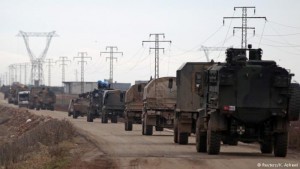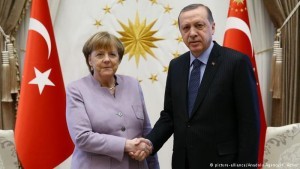The German head of government reminded the Turkish president that dissenting opinions are integral parts of a democratic government.
Speaking alongside Recep Tayyip Erdogan on Thursday in Ankara, Angela Merkel referenced the attempted July 2016 coup, in which a Turkish military faction attempted a political takeover, as an example of the Turkish people’s dedication to a democratic Turkey.
“With the (attempted) putsch, we saw how the Turkish people stood up for democracy and for the rules of democracy in Turkey,” Merkel said.
“That is exactly why, in this decisive phase, it is important that freedom of opinion is upheld and in connection with this we talked about press freedom,” she added.
The joint press conference was part of Merkel’s state visit to Ankara, a trip that Erdogan critics consider as condoning the Turkish President’s increasingly autocratic rule. After the failed July takeover, Erdogan ordered mass arrests of security forces, teachers and politicians, suspended thousands of judges, and clamped down on the media.
Merkel clearly called on Erdogan to safeguard diversity of opinion.
“Opposition is part of democracy,” she said.

Merkel on the defense
Merkel herself encountered opposition from the Turkish president for using the expression “Islamist terrorism.”
The German chancellor told the assembled reporters that she and Erdogan “spoke in detail about… the questions of the fight against Islamist terrorism, against every form of terrorism, also the terrorism of the PKK [Kurdistan Workers Party].”
Her statement prompted a strong rebuke from the Turkish president.
“This expression ‘Islamist terror’ seriously saddens us Muslims,” Erdogan said, speaking directly to Merkel. “Such an expression is not correct because Islam and terror cannot be associated. The meaning of Islam is peace.”
The phrase “Islamist terror” or “Islamic terror” is controversial because it links terror to the religion and not to crimes of individuals or organizations, such as the so-called Islamic State (IS).
In response, Merkel noted that a linguistic distinction exists in Germany between “Islam” and “Islamist” and then sought to reassure the Turkish people that “we do not just respect and value Muslims, but we want to work well together and fight this terrible terrorism together.”
Common interests: stability and counter-terrorism
During the morning’s bilateral talks, the two national leaders discussed their major shared geopolitical interests: achieving regional stability and combating international terrorism.
Erdogan told reporters that discussion centered around how the two NATO members could work together to improve the situation in Iraq and Syria, where the self-styled “Islamic State” (IS) continues to unleash violence on a civilian population, sending destabilizing ripples throughout the world.
The Turkish president also said he and Merkel talked about the refugee crisis in the Aegean Sea.
A new presidential plan
The meeting between the German and Turkish leaders took place among growing condemnation of Erdogan’s proposed presidential reforms.
The Turkish president is seeking to push through constitutional changes that would vastly expand his power, in effect handing all reigns of political power to Erdogan by replacing a parliamentary system with a presidential system.
However, Erdogan disputed that the proposed changes would collapse the separate branches of government into one.
“It is out of the question for the separation of powers to be abolished,” he told reporters. “[Reform] gives more opportunity for the executive branch to work more swiftly. The judiciary will retain its power and function as usual with the new system,” he added.
The parliament is expected to pass the constitutional reform bill to the President on Thursday or Friday. Once approved by the Erdogan, the bill will be presented to the Turkish people for approval in an April referendum.
Ask me anything
Explore related questions





